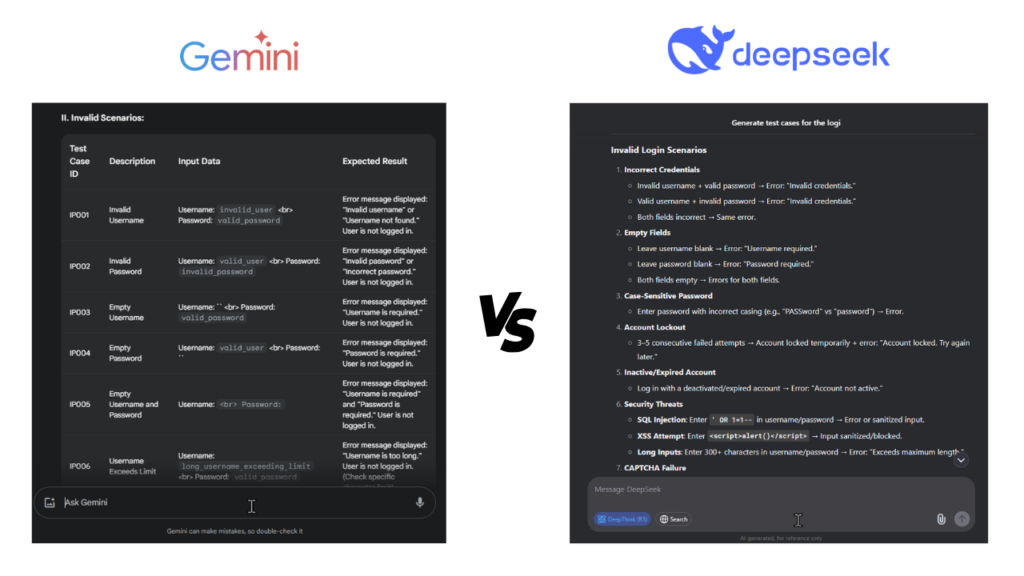Software testing has always been a critical part of development, ensuring that applications function smoothly before reaching users. Traditional testing methods struggle to keep up with the need for speed and accuracy. Manual testing, while thorough, can be slow and prone to human error. Automated testing helps but comes with its own challenges—scripts need frequent updates, and maintaining them can be time-consuming. This is where AI-driven testing is making a difference. Instead of relying on static test scripts, AI can analyze code, understand changes, and automatically update test cases without requiring constant human intervention. Both DeepSeek vs Gemini offer advanced capabilities that can be applied to software testing, making it more efficient and adaptive. While these AI models serve broader purposes like data processing, automation, and natural language understanding, they also bring valuable improvements to testing workflows. By incorporating AI, teams can catch issues earlier, reduce manual effort, and improve overall software quality.
Related Blogs
DeepSeek AI & Google Gemini – How They Help in Software Testing
DeepSeek AI vs Google Gemini utilize advanced AI technologies to improve different aspects of software testing. These technologies automate repetitive tasks, enhance accuracy, and optimize testing efforts. Below is a breakdown of the key AI Components they use and their impact on software testing.
Natural Language Processing (NLP) – Automating Test Case Creation
NLP enables AI to read and interpret software requirements, user stories, and bug reports. It processes text-based inputs and converts them into structured test cases, reducing manual effort in test case writing
Machine Learning (ML) – Predicting Defects & Optimizing Test Execution
ML analyzes past test data, defect trends, and code changes to identify high-risk areas in an application. It helps prioritize test cases by focusing on the functionalities most likely to fail, reducing unnecessary test executions and improving test efficiency.
Deep Learning – Self-Healing Automation & Adaptability
Deep learning enables AI to recognize patterns and adapt test scripts to changes in an application. It detects UI modifications, updates test locators, and ensures automated tests continue running without manual intervention.
Code Generation AI – Automating Test Script Writing
AI-powered code generation assists in writing test scripts for automation frameworks like Selenium, API testing, and performance testing. This reduces the effort required to create and maintain test scripts.
Multimodal AI – Enhancing UI & Visual Testing
Multimodal AI processes both text and images, making it useful for UI and visual regression testing. It helps in detecting changes in graphical elements, verifying image placements, and ensuring consistency in application design.
Large Language Models (LLMs) – Assisting in Test Documentation & Debugging
LLMs process large amounts of test data to summarize test execution reports, explain failures, and suggest debugging steps. This improves troubleshooting efficiency and helps teams understand test results more effectively.
Feature Comparison of DeepSeek vs Gemini: A Detailed Look
| S. No | Feature | DeepSeek AI | Google Gemini |
|---|---|---|---|
| 1 | Test Case Generation | Structured, detailed test cases | Generates test cases but may need further refinement |
| 2 | Test Data Generation | Diverse datasets, including edge cases | Produces test data but may require manual fine-tuning |
| 3 | Automated Test Script Suggestions | Generates Selenium & API test scripts | Assists in script creation but often needs better prompt engineering |
| 4 | Accessibility Testing | Identifies WCAG compliance issues | Provides accessibility insights but lacks in-depth testing capabilities |
| 5 | API Testing Assistance | Generates Postman requests & API tests | Helps with request generation but may require additional structuring |
| 6 | Code Generation | Strong for generating code snippets | Capable of generating code but might need further optimization |
| 7 | Test Plan Generation | Generates basic test plans | Assists in test plan creation but depends on detailed input |
How Tester Prompts Influence AI Responses
When using AI tools like DeepSeek vs Gemini for software testing, the quality of responses depends heavily on the prompts given by testers. Below are some scenarios focusing on the Login Page, demonstrating how different prompts can influence AI-generated test cases.
Scenario 1: Test Case Generation
Prompt:
“Generate test cases for the login page, including valid and invalid scenarios.”
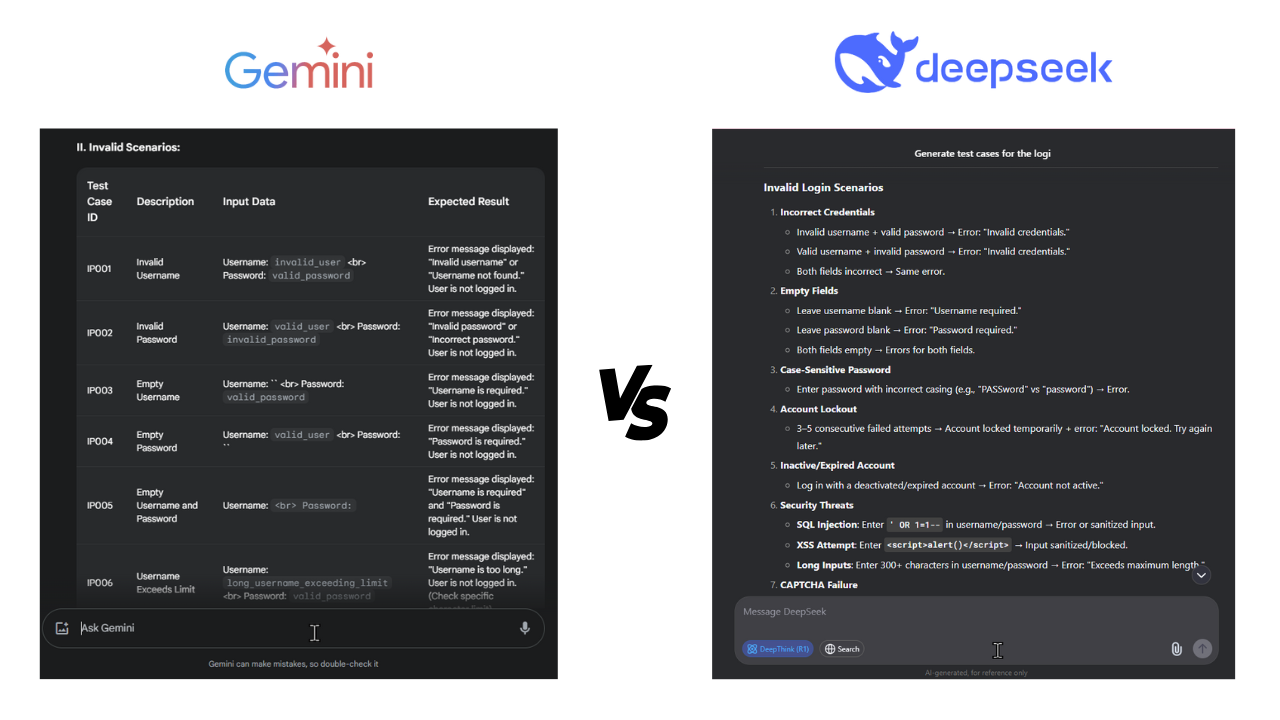
For test case generation, Google Gemini provides structured test cases with clear steps and expected results, making it useful for detailed execution. DeepSeek AI, on the other hand, focuses on broader scenario coverage, including security threats and edge cases, making it more adaptable for exploratory testing. The choice depends on whether you need precise, structured test cases or a more comprehensive range of test scenarios.
Scenario 2: Test Data Generation
Prompt:
“Generate diverse test data, including edge cases for login page testing.”
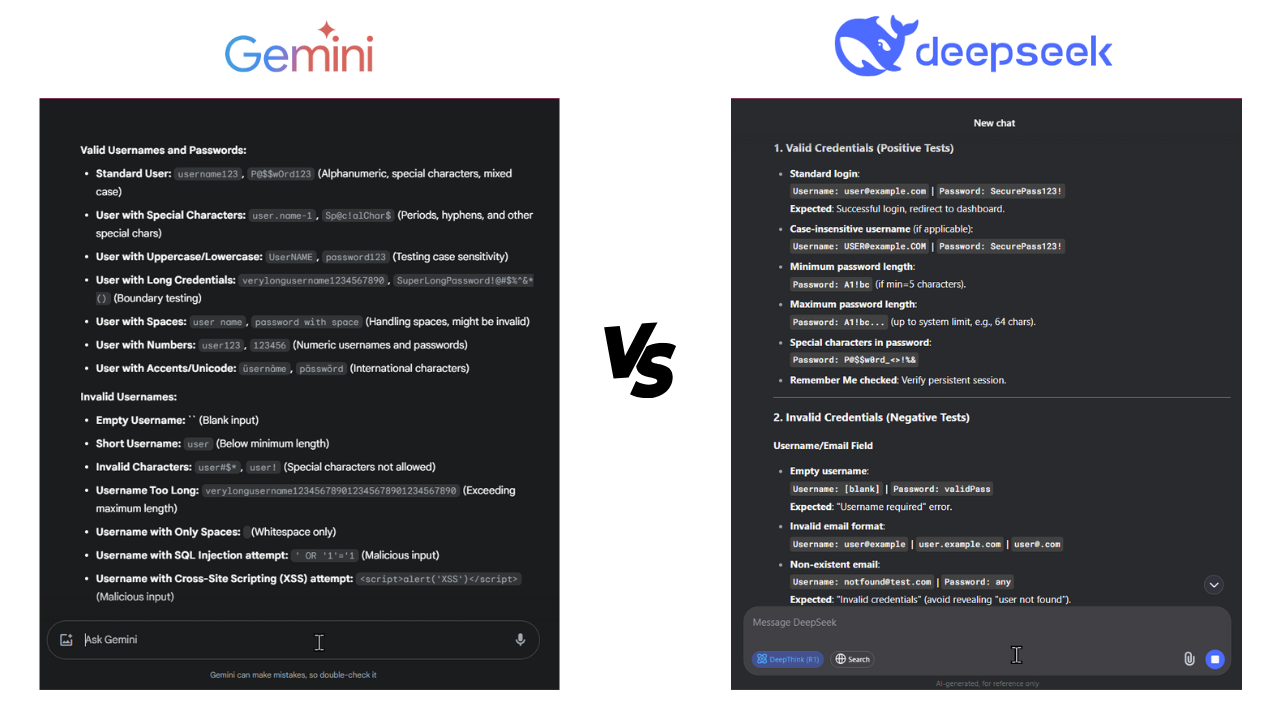
For test data generation, Google Gemini provides a structured list of valid and invalid usernames and passwords, covering various character types, lengths, and malicious inputs. DeepSeek AI, on the other hand, categorizes test data into positive and negative scenarios, adding expected results for validation. Gemini focuses on broad data coverage, while DeepSeek ensures practical application in testing.
Scenario 3: Automated Test Script Suggestions
Prompt:
“Generate a Selenium script to automate login validation with multiple test cases.”
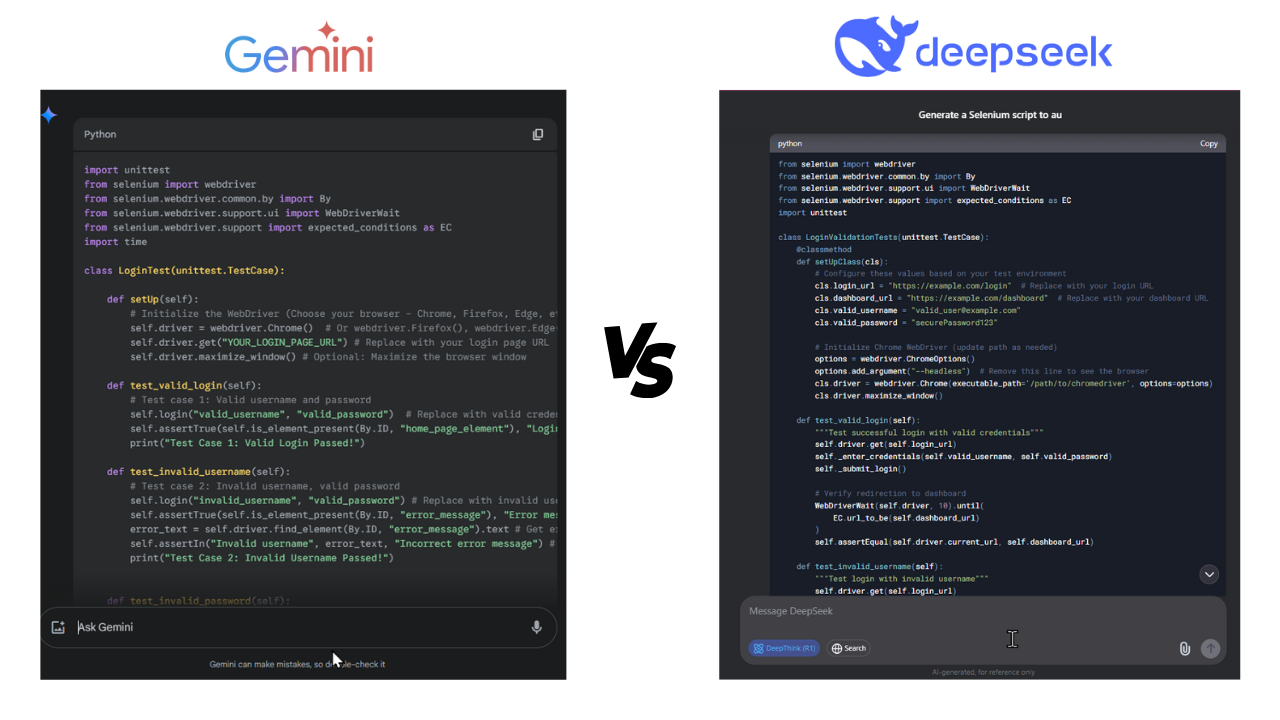
For automated test script generation, Google Gemini provides a basic Selenium script with test cases for login validation, but it lacks environment configuration and flexibility. DeepSeek AI, on the other hand, generates a more structured and reusable script with class-level setup, parameterized values, and additional options like headless execution. DeepSeek AI’s script is more adaptable for real-world automation testing.
Scenario 4: Accessibility Testing
Prompt:
“Check if the login page meets WCAG accessibility compliance.”
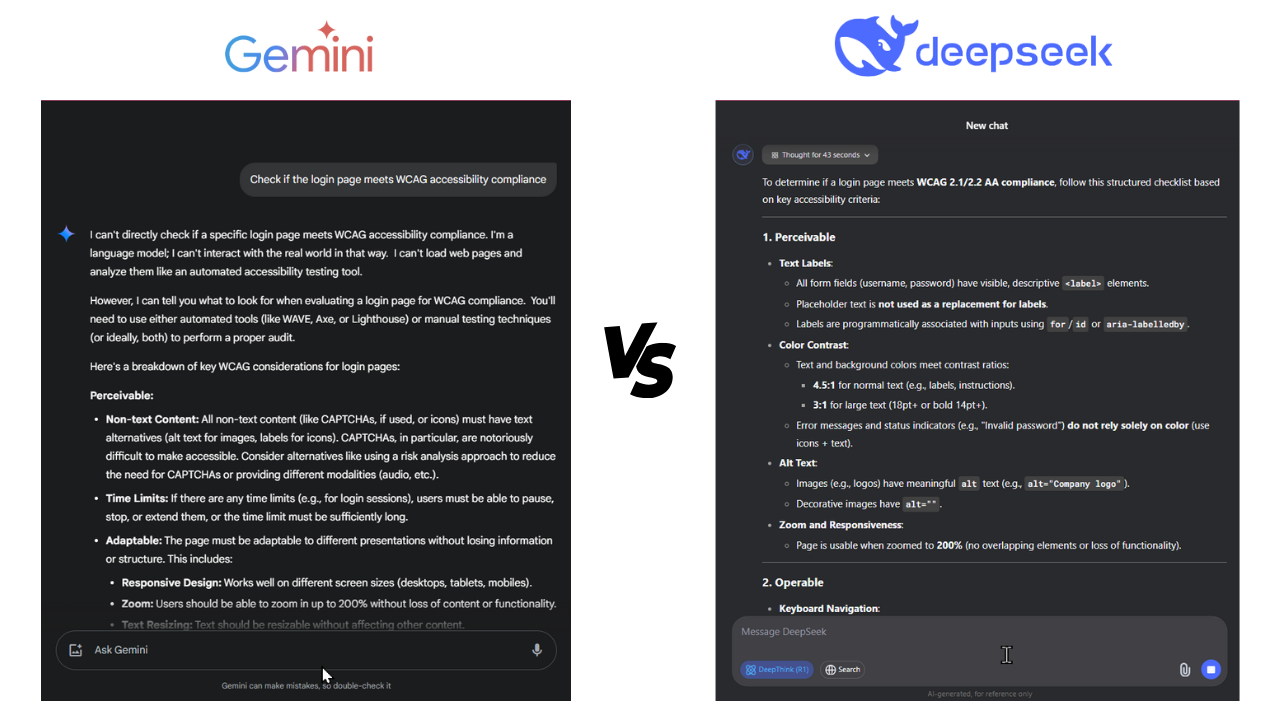
For accessibility testing, Google Gemini provides general guidance on WCAG compliance but does not offer a structured checklist. DeepSeek AI, however, delivers a detailed and structured checklist covering perceivability, operability, and key accessibility criteria. DeepSeek AI is the better choice for a systematic accessibility evaluation.
Scenario 5: API Testing Assistance
Prompt:
“Generate an API request for login authentication and validate responses.”
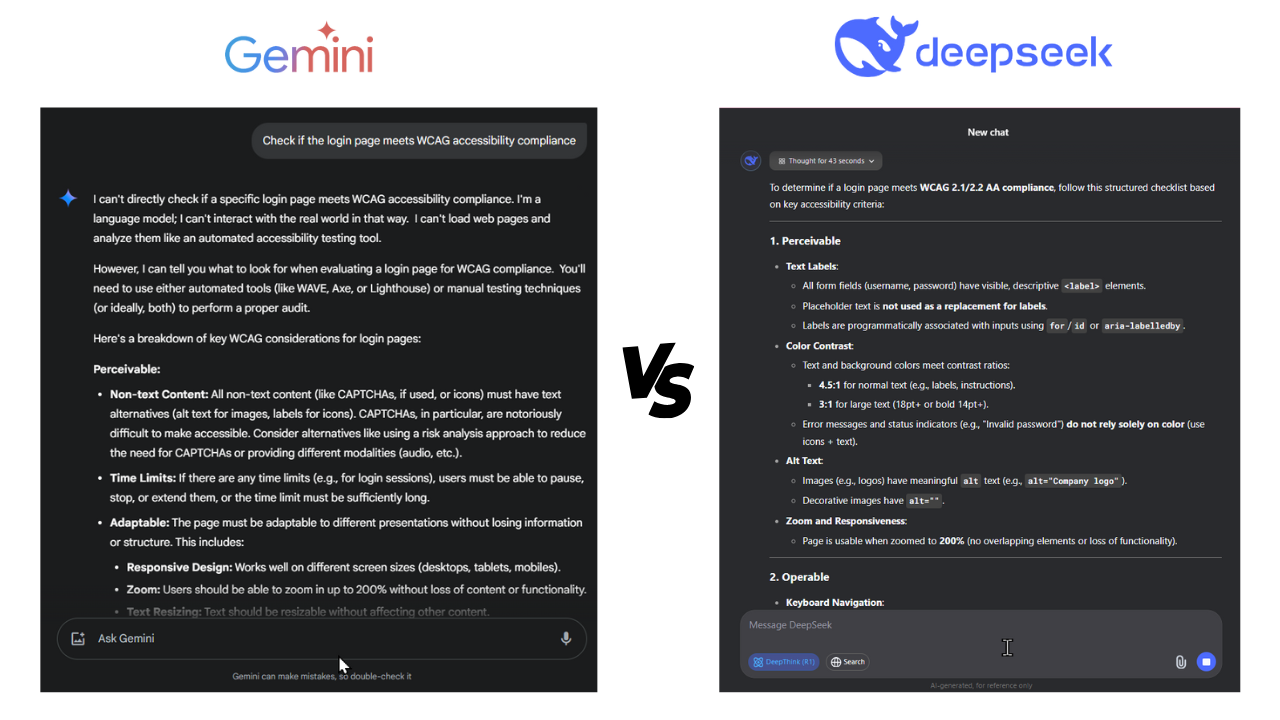
DeepSeek AI: Generates comprehensive API requests and validation steps.
Google Gemini: Helps in structuring API requests but may require further adjustments.
The way testers frame their prompts directly impacts the quality, accuracy, and relevance of AI-generated responses. By crafting well-structured, detailed, and scenario-specific prompts, testers can leverage AI tools like DeepSeek AI vs Google Gemini to enhance various aspects of software testing, including test case generation, automated scripting, accessibility evaluation, API validation, and test planning.
From our comparison, we observed that:
- DeepSeek AI specializes in structured test case generation, API test assistance, and automated test script suggestions, making it a strong choice for testers looking for detailed, automation-friendly outputs.
- Gemini provides broader AI capabilities, including natural language understanding and test planning assistance, but may require more prompt refinement to produce actionable testing insights.
- For Accessibility Testing, DeepSeek identifies WCAG compliance issues, while Gemini offers guidance but lacks deeper accessibility testing capabilities.
- Test Data Generation differs significantly – DeepSeek generates diverse datasets, including edge cases, whereas Gemini’s output may require manual adjustments to meet complex testing requirements.
- Automated Test Script Generation is more refined in DeepSeek, especially for Selenium and API testing, whereas Gemini may require additional prompt tuning for automation scripts.
Conclusion
AI technologies are changing software testing. They automate repetitive tasks and make tests more accurate. This makes testing workflows better. With improvements in machine learning, natural language processing, deep learning, and other AIs, testing is now faster and can adapt to today’s software development needs.
AI helps improve many parts of software testing. It makes things like creating test cases, finding defects, and checking the user interface easier. This cuts down on manual work and raises the quality of the software. With DeepSeek vs Gemini, testers can spend more time on making smart decisions and testing new ideas. They don’t have to waste time on regular tasks and running tests.
The use of AI in software testing depends on what testers need and the environments they work in. As AI develops quickly, using the right AI tools can help teams test faster, smarter, and more reliably in the changing world of software development.
Frequently Asked Questions
-
How does AI improve software testing?
AI enhances software testing by automating repetitive tasks, predicting defects, optimizing test execution, generating test cases, and analyzing test reports. This reduces manual effort and improves accuracy.
-
Can AI completely replace manual testing?
No, AI enhances testing but does not replace human testers. It automates routine tasks, but exploratory testing, user experience evaluation, and critical decision-making still require human expertise.
-
How does AI help in UI and visual testing?
DeepSeek AI is better suited for API testing as it can generate API test scripts, analyze responses, and predict failure points based on historical data.
-
How do I decide whether to use DeepSeek AI or Google Gemini for my testing needs?
The choice depends on your testing priorities. If you need self-healing automation, test case generation, and predictive analytics, DeepSeek AI is a good fit. If you require AI-powered debugging, UI validation, and documentation assistance, Google Gemini is more suitable.
The post DeepSeek vs Gemini: Best AI for Software Testing appeared first on Codoid.
Source: Read More


